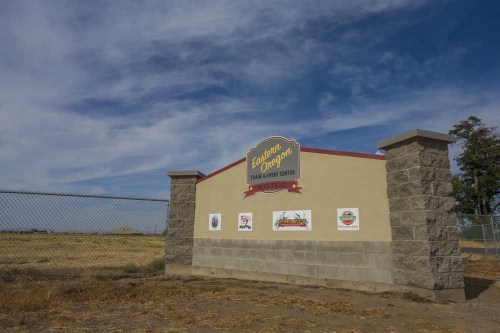Cities, counties face unknowns when budgeting during COVID-19
Published 5:00 am Saturday, April 11, 2020

- Hermiston School District and the city of Hermiston have partnered with a national day care provider, Champions, to create a child care facility at the Eastern Oregon Trade and Event Center.
UMATILLA COUNTY — As households and businesses adjust their budgets in reaction to COVID-19 shutdowns, cities and counties are also trying to navigate uncharted waters as they budget for the 2020-21 fiscal year.
The pandemic has affected just about every part of daily life, and with it, revenue local governments take in from sources ranging from gas taxes to facility rentals.
Trending
Hermiston’s Assistant City Manager Mark Morgan and Finance Director Mark Krawczyk feel Hermiston is in a better position than some communities when it comes to navigating the economic impacts of COVID-19. Since the Great Recession, a larger percentage of the city’s jobs have migrated toward essential industries, such as food processing.
“I would consider Hermiston in a better position now to weather a recession than in 2008,” said Morgan, adding that’s “not to imply we’re not concerned.”
The city has a lower than average percentage of people employed in hospitality and leisure industries. Morgan cited Census Bureau data showing the 16 industry sectors most closely tied to tourism, including restaurants and hotels, made up 7.8% of Hermiston jobs in 2017, compared with 11.6% countywide and 11.5% statewide. He said Hermiston hotels have likely seen some effects, but probably not as much as a resort town like Bend.
“The people who come to stay in a hotel in Hermiston, it’s because they’re working — they’re construction contractors, things like that,” he said.
That bodes well for the city’s ability to continue gathering transient room taxes and tourism promotion assessments on hotel room stays.
Hermiston doesn’t have a local gas tax, so it won’t see a drop there as people drive less, but there could be some impact on gas tax revenue coming from the state. Morgan said it’s too soon to know about that, and to predict the impact on revenue from funds like the state’s liquor tax. Most of the city’s franchise fees come from electric companies, but it’s also unclear how stay home orders will affect electricity usage. And right now federal stimulus money is “falling from the sky,” Morgan said, so the city could catch some windfalls.
Trending
Krawcyzk said the city is losing revenue from recreation program sign-ups, and rental revenue for the Eastern Oregon Trade and Event Center, Hermiston Community Center, parks and meeting spaces. The city has been working to get the relatively new EOTEC profitable, and the ban on gatherings has put a damper on momentum they had been gaining.
“We had virtually no revenue there in March, and will have none in April and May,” he said.
However, the city does benefit from the fact that it isn’t depending on the revenue to pay off debt service for its facilities.
In many cases, Krawcyzk said, reductions in revenue have been somewhat offset by reductions in cost. The city usually subsidizes the Hermiston Aquatic Center through its general fund, for example, so if the pool didn’t open this year they would lose admissions revenue but also not be paying lifeguards.
While the stock market has taken a hit in the past month, Krawczyk said the city invests so conservatively and interest on reserves are such a small part of the budget that it’s not a major issue.
He said department heads are working on budgets now, and after he and City Manager Byron Smith review them, they can decide if they need to make cuts to those requests.
“We’re always very conservative at the get-go,” he said.
Pendleton expecting key revenue sources to be down
Robb Corbertt has been Pendleton’s city manager since 2011, when the country was still recovering from a recession.
But Corbett compared the current moment to when Oregon passed measures 47 and 50 in the 1990s, capping property tax rates and forcing cities to rethink their budgets due to the lost revenue.
Corbett said he wouldn’t be able to talk definitively about the 2020-21 budget for another few weeks, but he expected key sources of revenue like property taxes and parks and recreation fees would be down.
The Pendleton Convention Center might be hit especially hard by the economic downturn because of the way it derives its revenue.
According to the city’s 2019-20 budget, about 87% of the Pendleton Convention Center Fund’s revenue comes from the lodging room tax and charges for fees. City officials are currently crafting the budget at a time when the convention center is forced to close because almost all of the events that would take place there are banned, and tourism and travel are cratering as people around the Northwest comply with stay home orders.
In the interim, Corbett said he has reassigned convention center employees to other roles across the city.
Umatilla County prepares for reduced revenue
According to Umatilla County Commissioner George Murdock, who serves as the commissioners’ budget liaison, the revenues for the 2019-20 budget are already in place and the county has maintained its basic spending so far.
However, the commissioners have preemptively directed department heads to make contingency plans, eliminate nonessential spending, limit travel and freeze all hiring except in emergency situations approved by the board.
“If there is a fear, it is that while we are financially able to somewhat continue business as usual this spring, that’s only because the revenues are in hand to sustain basic spending,” Murdock wrote in an email to county staff earlier this week. “We have no such guarantees going forward and therefore we should be doing our due diligence in preparing for funding declines.”
Based on Murdock’s message to the staff, those funding declines could come from a variety of sources, including anticipated delays and reductions in both property and income tax collections.
County programs, such as community corrections and drug and alcohol treatment services, have already seen a decrease in clients. These and other programs that either rely on or are supplemented by state grant programs are contingent on client numbers, so their revenue is likely to decline with them.
Other fees the county usually receives for home construction, travel and other services are also expected to decline, Murdock said. And, usual revenues from school districts and other sources remain uncertain.
The potential budget shortfalls could require the county to pause its planned additions to the sheriff’s office, which has emphasized increasing its patrol deputy force over the past few years. It may also limit further growth of the planning department, which was expanding to reflect the county’s greater demand for economic development and help with post-flood recovery.
Additional growth of those departments has been budgeted, Murdock said, but is dependent on them continuing to bring in the revenues they were initially projected to before the pandemic.
Some of the county’s capital projects that have already been budgeted and contracted are expected to be completed as planned, including reroofing the public safety center for more than $500,000 and the $1.6 million jail renovation, which is being funded by the state.
“We’re reluctant to do things with projects that might impact business activity in the community any more than it already is,” Murdock said.
Murdock wrote to staff that the pandemic is currently projected to spike in Oregon by May 6, though he expects at least four to six weeks to pass after that before “we’re completely out of the woods.” While things will hopefully begin to improve and recover after that, it won’t be immediate.
“So, what we can pretty accurately predict is that we will be at least halfway through the 2020-21 budget cycle before the turnaround is genuinely real and that the impact of COVID-19 will be with us through much of the 2020-21 budget cycle,” Murdock wrote.









